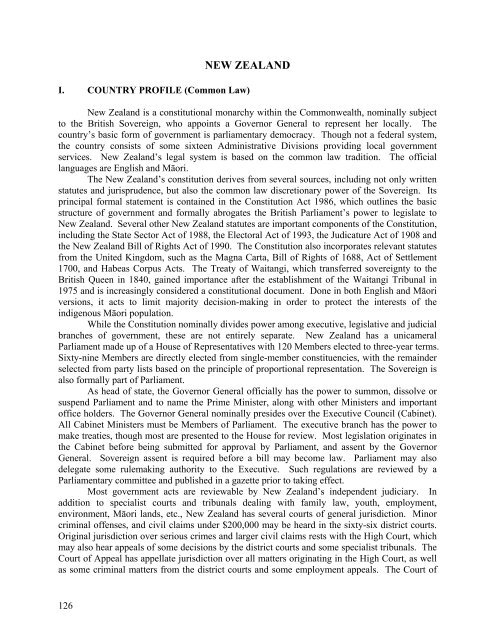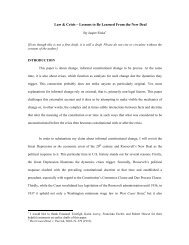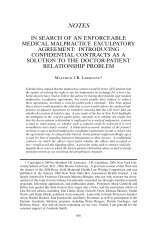Guide to Foreign and International Legal Citations - New York ...
Guide to Foreign and International Legal Citations - New York ...
Guide to Foreign and International Legal Citations - New York ...
Create successful ePaper yourself
Turn your PDF publications into a flip-book with our unique Google optimized e-Paper software.
126<br />
NEW ZEALAND<br />
I. COUNTRY PROFILE (Common Law)<br />
<strong>New</strong> Zeal<strong>and</strong> is a constitutional monarchy within the Commonwealth, nominally subject<br />
<strong>to</strong> the British Sovereign, who appoints a Governor General <strong>to</strong> represent her locally. The<br />
country’s basic form of government is parliamentary democracy. Though not a federal system,<br />
the country consists of some sixteen Administrative Divisions providing local government<br />
services. <strong>New</strong> Zeal<strong>and</strong>’s legal system is based on the common law tradition. The official<br />
languages are English <strong>and</strong> Māori.<br />
The <strong>New</strong> Zeal<strong>and</strong>’s constitution derives from several sources, including not only written<br />
statutes <strong>and</strong> jurisprudence, but also the common law discretionary power of the Sovereign. Its<br />
principal formal statement is contained in the Constitution Act 1986, which outlines the basic<br />
structure of government <strong>and</strong> formally abrogates the British Parliament’s power <strong>to</strong> legislate <strong>to</strong><br />
<strong>New</strong> Zeal<strong>and</strong>. Several other <strong>New</strong> Zeal<strong>and</strong> statutes are important components of the Constitution,<br />
including the State Sec<strong>to</strong>r Act of 1988, the Elec<strong>to</strong>ral Act of 1993, the Judicature Act of 1908 <strong>and</strong><br />
the <strong>New</strong> Zeal<strong>and</strong> Bill of Rights Act of 1990. The Constitution also incorporates relevant statutes<br />
from the United Kingdom, such as the Magna Carta, Bill of Rights of 1688, Act of Settlement<br />
1700, <strong>and</strong> Habeas Corpus Acts. The Treaty of Waitangi, which transferred sovereignty <strong>to</strong> the<br />
British Queen in 1840, gained importance after the establishment of the Waitangi Tribunal in<br />
1975 <strong>and</strong> is increasingly considered a constitutional document. Done in both English <strong>and</strong> Māori<br />
versions, it acts <strong>to</strong> limit majority decision-making in order <strong>to</strong> protect the interests of the<br />
indigenous Māori population.<br />
While the Constitution nominally divides power among executive, legislative <strong>and</strong> judicial<br />
branches of government, these are not entirely separate. <strong>New</strong> Zeal<strong>and</strong> has a unicameral<br />
Parliament made up of a House of Representatives with 120 Members elected <strong>to</strong> three-year terms.<br />
Sixty-nine Members are directly elected from single-member constituencies, with the remainder<br />
selected from party lists based on the principle of proportional representation. The Sovereign is<br />
also formally part of Parliament.<br />
As head of state, the Governor General officially has the power <strong>to</strong> summon, dissolve or<br />
suspend Parliament <strong>and</strong> <strong>to</strong> name the Prime Minister, along with other Ministers <strong>and</strong> important<br />
office holders. The Governor General nominally presides over the Executive Council (Cabinet).<br />
All Cabinet Ministers must be Members of Parliament. The executive branch has the power <strong>to</strong><br />
make treaties, though most are presented <strong>to</strong> the House for review. Most legislation originates in<br />
the Cabinet before being submitted for approval by Parliament, <strong>and</strong> assent by the Governor<br />
General. Sovereign assent is required before a bill may become law. Parliament may also<br />
delegate some rulemaking authority <strong>to</strong> the Executive. Such regulations are reviewed by a<br />
Parliamentary committee <strong>and</strong> published in a gazette prior <strong>to</strong> taking effect.<br />
Most government acts are reviewable by <strong>New</strong> Zeal<strong>and</strong>’s independent judiciary. In<br />
addition <strong>to</strong> specialist courts <strong>and</strong> tribunals dealing with family law, youth, employment,<br />
environment, Māori l<strong>and</strong>s, etc., <strong>New</strong> Zeal<strong>and</strong> has several courts of general jurisdiction. Minor<br />
criminal offenses, <strong>and</strong> civil claims under $200,000 may be heard in the sixty-six district courts.<br />
Original jurisdiction over serious crimes <strong>and</strong> larger civil claims rests with the High Court, which<br />
may also hear appeals of some decisions by the district courts <strong>and</strong> some specialist tribunals. The<br />
Court of Appeal has appellate jurisdiction over all matters originating in the High Court, as well<br />
as some criminal matters from the district courts <strong>and</strong> some employment appeals. The Court of
















